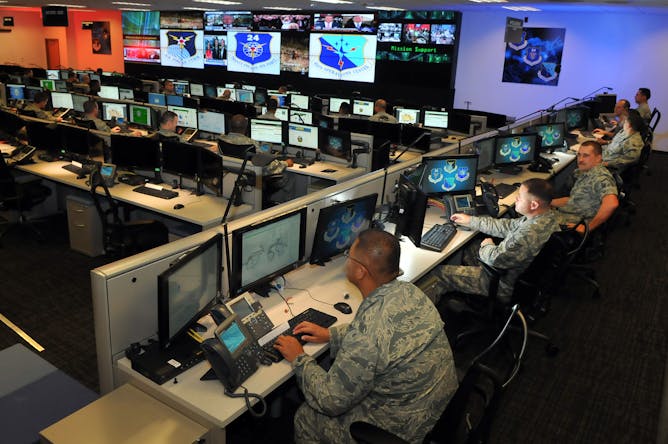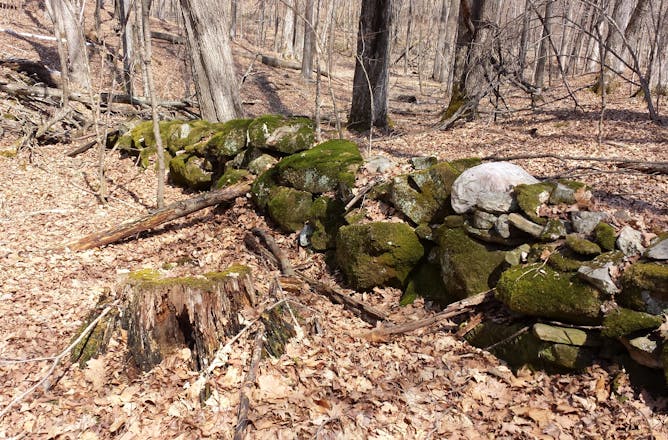Editor's note
|
|
During the 2018 election, the U.S. military engaged for the first time in offensive cyberwarfare tactics against Russian agents. It’s a new strategy after years of focusing on cyberdefense – but Marine Corps University scholars Benjamin Jensen and Brandon Valeriano warn that the changed approach may be more dangerous than U.S. officials hope.
Martha McSally is a tough woman. Now a senator, she was the first American woman to fly combat missions for the Air Force. But this powerful woman told a congressional committee last week that years ago, she was raped and preyed upon by her military superiors – and that made her feel “powerless.” Many sexual violence victims feel that way, writes law professor Leigh Goodmark, who believes the response has roots in
antiquated notions about sexual violence embedded in the U.S. legal system.
Have you ever walked through the woods in the northeastern U.S. and found yourself following an old stone wall? University at Albany geologist John Delano has. And decades after the first time he wondered about how and why these walls were built, he had a flash of insight: These forgotten boundary markers could tell scientists about which way the compass pointed centuries ago.
|
Jeff Inglis
Science + Technology Editor
|

|
|
Top stories
|

The U.S. military is shifting the focus of its cyberwarfare forces.
U.S. Air Force
Benjamin Jensen, American University School of International Service; Brandon Valeriano, Marine Corps University
A new strategy for U.S. Cyber Command seeks to block enemies from achieving their objectives – but may not be successful, and could have unforeseen consequences.
|

U.S. Sen. Martha McSally, R-Ariz., spoke during a Senate hearing on March 6 about being sexually assaulted in the military.
REUTERS/Joshua Roberts
Leigh Goodmark, University of Maryland, Baltimore
Sen. Martha McSally has broken gender barriers right and left. Despite the power she amassed over a career of firsts, she felt 'powerless' when raped. She's not the only woman to feel that way.
|

The orientations of the stone walls that crisscross the Northeastern U.S can tell a geomagnetic tale as well as a historical one.
John Delano
John Delano, University at Albany, State University of New York
Scientific inspiration struck a geologist after many walks through the woods in New York and New England. These ruins hold the secret of where the compass pointed north when they were built centuries ago.
|
|
|
Economy + Business
|
-
Eric Hoyt, University of Massachusetts Amherst; JD Swerzenski, University of Massachusetts Amherst
President Trump says that the white working class is being pushed out of the job market. But that doesn't seem to be true for the best-paying blue-collar jobs.
-
Adrienne Rose Bitar, Cornell University
Many diets make the case that eating certain types of foods will improve your health while redeeming our society and saving the planet.
|
|
|
|
|
|
Environment + Energy
|
-
Wil Burns, American University School of International Service; Greg H. Rau, University of California, Santa Cruz
Adding industrial chemicals and natural alkaline minerals could slow climate change, but like other geoengineering proposals, it comes with many complex technical and legal challenges.
-
Jennifer Weeks, The Conversation
China, which once processed much of the world's scrap, has slashed imports of "foreign garbage." What can the US do to step up recycling at home?
|
|
|
|
From our International Editions
|
-
Gilles Pison, Muséum national d’histoire naturelle (MNHN) – Sorbonne Universités
Immigration is seen as a global crisis, but the distribution of immigrants is anything but equal. Which countries have the most? Where they come from? Data provides some surprising answers.
-
Sam Williams, Durham University
Black leopards are different because of a recessive genetic variation known as "melanism".
-
Nadia Wager, University of Huddersfield
A documentary film has made disturbing allegations about Michael Jackson and child sexual abuse. Whether true or not the film raised some important issues.
|
|
|
|
| |
| |
|
|